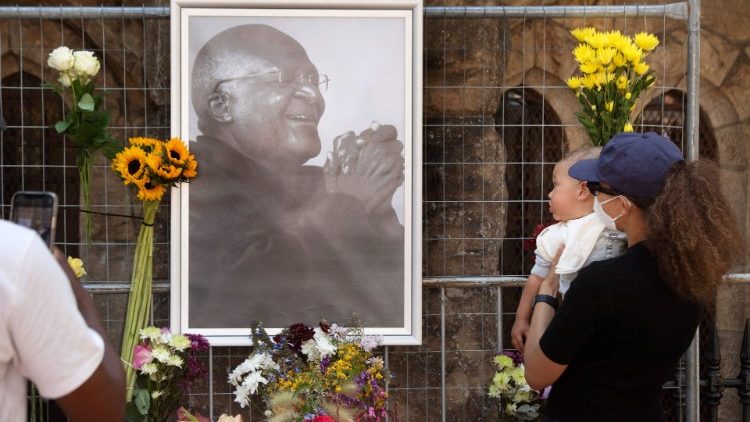The funeral for Archbishop Desmond Tutu has been set for January 1, New Year’s Day as announced by the Archbishop of Cape Town Thabo Makgoba who will lead the service at the city’s St. George’s Cathedral.
Archbishop Tutu, the Nobel Peace Prize-winning Anglican cleric whose good humor, inspiring messages and conscientious work for civil and human rights made him a revered leader during the struggle to end apartheid in his native South Africa, died on Sunday December 26 at the age of 90.
As a Noble Peace Prize-winner, he is coincidentally being buried on January 1, a day dedicated to World Peace.
His mortal remains have been lying in state in his old Cathedral at St George’s in Cape Town, South Africa where mourners have been filing past the coffin.
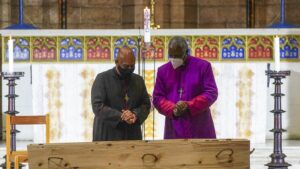
The funeral Service will be “At 10am on Saturday, New Year’s Day, the funeral will take place here and it is here where his ashes will also be interred,’’ the Archbishop of Cape Town announced as reported by myjoyonline.com
Covid-19 restrictions mean that only 100 people can attend the funeral of South African anti-apartheid hero Archbishop Desmond Tutu, a long-time friend of Nelson Mandela. Archbishop Tutu won the Nobel prize in 1984 in recognition of his non-violent opposition to white minority rule. He led numerous campaigns and marches against apartheid from St George’s steps, which became known as the ”People’s Cathedral” and a symbol of democracy.
On Friday, December 31, Archbishop Tutu will lie in state at the cathedral.
Meanwhile, despite his death on Sunday at the age of 90, the late Archbishop Desmond Tutu remains a beacon of freedom and truth for South Africans and people across the globe, according to Catholic Bishop Jan de Groef.
As South Africans lament the death of the Nobel Peace Prize Laureate and former Anglican Archbishop of Cape Town, the nation’s Catholic community is seeking to remember the legacy of Archbishop Desmond Tutu.
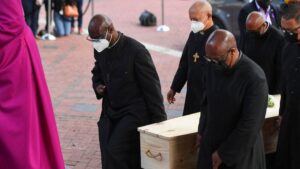
Among his many achievements, the Archbishop led the Truth and Reconciliation Commission set up to seek restorative—not retributive—justice for crimes committed during the apartheid era.
The Catholic Bishop of Bethlehem in South Africa, Jan de Groef, was among those who recalled Archbishop Tutu as a “beacon” who “reminds us of our calling as shepherds.”
Speaking to Vatican News’ Claire Riobe, Bishop de Groef said he hoped all Church leaders might be faithful as the late Archbishop was.
“Archbishop Tutu was very engaged for the truth and for freedom, recognizing each and every person’s dignity,” said the Bishop. “So, that’s really something that remains in the hearts of people.”
Events are being held this week across South Africa to remember Archbishop Tutu, including ecumenical and interfaith services. His remains will be cremated and interred in the mausoleum of St. George’s Cathedral in Cape Town.
The late Archbishop was also active in ecumenical efforts and maintained good relations with other denominations, including the Catholic Church.
Bishop de Groef said the local Church hopes to continue in its ecumenical efforts with other Christians to foster “that unity between us which is so important for South Africa, as well as for the whole world.”
Pope Expresses Condolences
On the same day as his death, Pope Francis sent his condolences for the death of the “servant of the Gospel” and paid tribute to his “promotion of racial equality and reconciliation in his native South Africa,” according to the Vatican News.
In a telegramme sent to Archbishop Peter B. Wells, Apostolic Nuncio in South Africa and signed by Vatican Secretary of State Pietro Parolin, the Pope said he was saddened to learn of the Archbishop’s death.
Pope Francis also paid tribute to his service to the Gospel through the “promotion of racial equality and reconciliation in his native South Africa.”
In the telegramme, the Pope invoked “the divine blessings of peace and consolation of the Lord” upon all who mourn Archbishop Tutu’s passing.
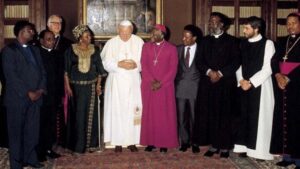
In a message posted on its website, the Southern African Bishops’ Conference conveyed its condolences to “Mrs. Leah Tutu, the family and the Anglican Church over the death of the Late Archbishop Emeritus of Cape Town, Desmond Mpilo Tutu.”
The Archbishop, the message read, “will be remembered for his immense spiritual contribution to the liberation and democracy of South Africa, the reason for which he was a joint laureate of the Nobel Peace Prize. His quest for justice continued when he was the Chairperson of the Truth and Reconciliation Commission and beyond.”
The Anglican Archbishop was born near Johannesburg but spent most of his later life in Cape Town and led numerous marches and campaigns to oppose the policy of racial segregation and discrimination.
When apartheid came to an end in the early 1990’s and Nelson Mandela became president of the country, Archbishop Tutu was named chair of South Africa’s Truth and Reconciliation Commission.
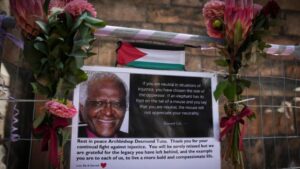
As well as winning the Nobel Peace Prize in 1984, the Archbishop was awarded the Templeton Prize for his “life-long work in advancing spiritual principles such as love and forgiveness which has helped to liberate people around the world”.

